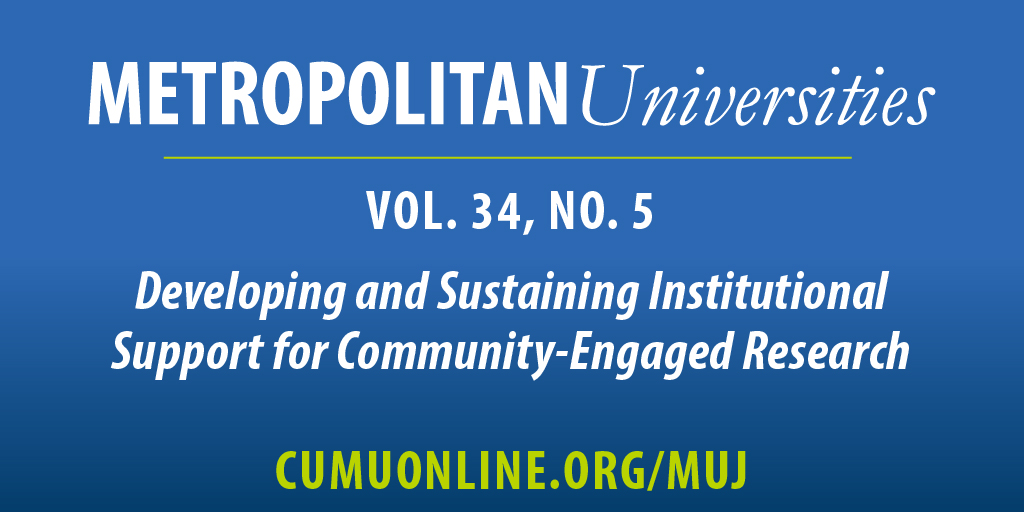Evaluating Community-Engaged Research in Promotion and Tenure
DOI:
https://doi.org/10.18060/26658Keywords:
community engaged research, community engaged scholarship, promotion and tenure, evaluation, metricsAbstract
To advance and encourage partnerships between institutions and their greater communities, academic reward structures must be designed in ways that support those who choose to leverage their expertise, resources, and time to engage with community in meaningful and mutually beneficial ways. This study investigates how school- and department-level promotion and tenure committees define, understand, and evaluate faculty’s engaged research. Specifically, this study explored what goes into making evaluative decisions and how evaluative decisions are made (e.g., how review committees define and categorize faculty’s engaged research, what metrics are used to assess it). In this single case multi-site qualitative study 12 participants across five R1 institutions classified as engaged by the Carnegie Foundation participated in semi-structured interviews. All participants were tenured, engaged scholars with experience serving on a school- and/or department-level promotion and tenure review committee. Findings demonstrate that review committees struggle to define, categorize, and evaluate community engaged research in promotion and tenure, as they are forced to exclusively rely on a traditional set of metrics to evaluate the engaged work of their peers. Though universities are making strides to institutionalize engagement, appropriate recognition of engaged research within promotion and tenure is not yet a reality.
References
Abel, S., & Williams, R. (2019). The guide: Documenting, evaluating, and recognizing engaged Scholarship. Purdue University Office of Engagement, 1-38.
Alperin, J. P., Munoz Nieves, C., Schimanski, L., Fischman, G. E., Niles, M. T., & McKiernan, E. C. (2018). How significant are the public dimensions of faculty work in review, promotion, and tenure documents?. Humanities Commons [preprint].
http://dx.doi.org/10.17613/M6W950N35
Berg, B. L. (1995). Qualitative research methods for the social sciences. Allyn & Bacon.
Boyer, E. L. (1990). Scholarship reconsidered: Priorities of the professoriate. The Carnegie Foundation for the Advancement of Teaching.
Colbeck, C. L., & Wharton-Michael, P. (2006). Individual and organizational influences on faculty members’ engagement in public scholarship. New Directions of Teaching and Learning, 105, 17-26. https://doi.org/10.1002/tl.221
Creswell, J. W. (2007). Qualitative inquiry & research design: Choosing among five approaches. Sage.
Deetz, S. (2008). Engagement as co-generative theorizing. Journal of Applied Communication Research, 36(3), 289-297. https://doi.org/10.1080/00909880802172301
Diamond, R. M. (2005). Scholarship reconsidered: Barriers to change. In K. A. O’Meara & R. E. Rice (Eds.), Faculty priorities reconsidered: Rewarding multiple forms of scholarship (pp. 56-71). Jossey-Bass.
Driscoll, A. (2008). Carnegie’s community engagement classification: Intentions and insights. Change, 38-42.
https://www.immagic.com/eLibrary/ARCHIVES/GENERAL/CFAT_US/C071119D.pdf
Ellison, J., & Eatman, T. K. (2008). Scholarship in public: Knowledge creation and tenure policy in the engaged university. Imaging America. https://surface.syr.edu/ia/16/
Holland, B. A. (2005). Institutional differences in pursuing the public good. In A. Kezar, T. C. Chambers, & J. C. Burkhard (Eds.), Higher education for the public good: Emerging voices from a national movement (pp. 235-259). Jossey-Bass.
Holland, B. A. (2009). Will it last? Evidence of institutionalization at Carnegie classified community engagement institutions. New Directions for Higher Education, 147, 85-98. 10.1002/he.361
Jordan, C., Wong, K. A., Jungnickel, P. W., Joosten, Y. A., Leugers, R. C., & Shields, S. L. (2009). Community-engaged scholarship review, promotion and tenure package. A guide for faculty and committee members. Metropolitan Universities, 20(2), 66-86. https://journals.iupui.edu/index.php/muj/article/view/20391/19995
Noel, J., & Earwicker, D. P. (2015). Documenting community engagement practices and outcomes: Insights from recipients of the 2010 Carnegie community engagement classification. Journal of Higher Education Outreach and Engagement, 19(3), 33-61.
https://files.eric.ed.gov/fulltext/EJ1077473.pdf
O’Meara, K. A. (2002). Uncovering the values in faculty evaluation of service as scholarship. Review of Higher Education, 26(1), 57-80. 10.1353/rhe.2002.0028
O’Meara, K. A. (2005). Encouraging multiple forms of scholarship in faculty reward systems: Does it make a difference?. Research in Higher Education, 46(5), 479-510. https://www.jstor.org/stable/40197355
O’Meara, K. A., Eatman, T., & Petersen, S. (2015). Advancing engaged scholarship in promotion and tenure: A roadmap and call for reform. Liberal Education, 101(3), 1-9. https://eric.ed.gov/?id=EJ1095096
Saltmarsh, J., Giles Jr., D. E., O’Meara, K. A., Sandmann, L., Ward, E., & Buglione, S. M. (2009). Community engagement and institutional culture in higher education. In B. E. Moely (Ed.), Creating our identities in service-learning and community engagement (pp. 3-29). Information Age Publishing.
Sobrero, P., & Jayaratne, K. S. U. (2014). Scholarship perceptions of academic department heads: Implications for promoting faculty community engagement scholarship. Journal of Higher Education Outreach and Engagement, 18(1), 123-151. https://files.eric.ed.gov/fulltext/EJ1024169.pdf
Stake, R. E. (2010). Qualitative research: Studying how things work. Guilford Press.
Strauss, A. L., & Corbin, J. (1990). Basics of qualitative research. Sage.
Wade, A., & Demb, A. (2009). A conceptual model to explore faculty community engagement. Michigan Journal of Community Service Learning, 15, 5-16. https://eric.ed.gov/?id=EJ859461
Ward, K. (2005). Rethinking faculty roles and rewards for the public good. In A. Kezar, T. C. Chambers, & J. C. Burkhard (Eds.), Higher education for the public good: Emerging voices from a national movement (pp. 217-234). Jossey-Bass.
Weerts, D. J., & Sandmann, L. R. (2008). Building a two-way street: Challenges and opportunities for community engagement at research universities. The Review of Higher Education, 32(1), 73-106. 10.1353/rhe.0.0027
Wood, E., Price, M. F., Stanton-Nichols, K., Hatcher, J.A., Hong, Y., Haberski, R., Silverman, R., Goodlett, C., & Palmer, K. L. (2018). Strategies for developing and documenting products of public scholarship in research and creative activity. IUPUI Scholarworks.
Downloads
Published
Issue
Section
License
Copyright (c) 2023 Lauren Wendling

This work is licensed under a Creative Commons Attribution 4.0 International License.



